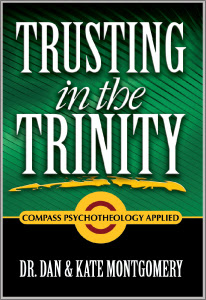To some, it is a scandalous
position; for others, even worse…it is unreasonable. To propose, as compass psychotheology
does, that psychology finds its purpose when grounded in the Trinitarian God.
And that theology is distorted unless examined under the lens of psychology.
Further, compass psychotheology
proposes that it is possible to summarize the God-human relationship with a
two-word equation. An equation developed from the Biblical salvation narrative,
asserting that human beings derive their essence as persons within the loving
interpersonal field of the triune God. An equation which assumes that human
beings, distinct from all other creatures, are created in the image of God and
called to become persons in communication and communion with the Father, Son,
and Holy Spirit.
The Existential Intimacy Equation
Compass psychotheology proposes that the following paradigm
illustrates both the meaning of existence of persons and the existential
intimacy possible between God and every human being.
What does it mean, that God
desires existential intimacy with each person? We would suggest that God’s most
identifying trait is his existence as infinite Subject (represented by the
upper case “I AM”)—a divine center of uncreated personal awareness designated
by the ontological title, “I AM” (Ex 3:14, Jn 8:58).
And that it is through
God’s eagerness to share his essential Being that he urges each person (represented
by the lower case “i am”) into a relationship of love and reciprocity. Such
loving participation in God is not pantheism, for God is the ever-transcendent
Creator, while humans are finite, non-divine creatures and never cease being
so. People depend upon God’s Being as the ontological foundation of life and
truth, while God depends upon no one. “God lives in creation in a God-like way,
and the world lives in God in a world-like way,” as Jurgen Moltman says.
God desires people to participate in communion with
the Trinity and others. People are fulfilled to the extent that they do. This
notion of God’s one-on-one participation in intimate dialogue with individuals
presupposes that God is not only an immutable essence, but also a living
person whose nature defines the meaning of personhood (cf. Nah 1:4-5 NICOT).
God initiates relationships with individuals
that grow over time, modulated to the person’s level of maturity and God’s own
desire for affiliation. One can see this in Yahweh and his bond with Abraham.
Hagar. Hannah. Samuel. David. Solomon. With the prophets. Each relationship is
different; each has its own rhythm of communication and communion.
But above all, God demonstrates his personal fidelity
to individuals. When Jeremiah receives his call from the Lord, he is told:
“Before I formed you from the womb, I knew you intimately” (Jer 1:5). The
Hebrew word yada, “know,” expresses
God’s longing for relational closeness, for it means to know intimately, as a
man and woman know each other in marriage (Gen 4:1).
Fellowship of Mutual
Indwelling
On
the right side of the equation, the “I AM” nestled within the “i am” represents
God’s infinite love that dwells in the core of each person as potentiality, but
requires voluntary cooperation for actualizing. This means that individuals are
infinitely significant to the triune God, who has extended a personal
invitation to share the eternal blessedness of his inner life. God is in
persons in a divine way and they are called to live in God in a human way, a
way of intimate fellowship and indwelling.
Jesus
expresses this reality in his prayer for existential intimacy between the
Father and those who will believe in him:
“As you, Father, are in me and I am in you, may they also be in us, so that the world may believe that you have sent me. The glory that you have given me I have given them, so that they may be one, as we are one, I in them and you in me, that they may become completely one, so that the world may know that you have sent me and have loved them even as you have loved me” (Jn 17: 21-23).
On
the left side of the equation, “i am” is invited to abide in loving
reciprocity with “I AM,” a communion that echoes the intimacy of the divine
triune community, for “your life is hidden with Christ in God” (Col 3:3). This
relationship encompasses the whole of one’s personality and human nature.
"i am" in Relationship with "I AM"
Because
God is their common Origin, all people possess the potential for responding to
God and for carrying the fruit of that relationship into their daily lives (cf.
Acts 10:34). But accepting God’s invitation to intimacy requires action. It
means embracing responsibility for one’s part in a growing and dynamic bond in
which one initiates and pursues, expressing authentic feelings and heart’s
desires. In this endeavor it is “i am” who risks emotional vulnerability
when building a relationship with “I AM.”
 |
| Habakkuk |
Habakkuk
was such a person. Confused and troubled over what he viewed as oppression of
the Israelites, he risked expressing these concerns to Yahweh. Readying himself
for rebuke, Habakkuk found instead that his “dialogue of protest” resulted in
God’s gentle disclosure of a larger picture (Hab 1:12-2:1; 2:20). Habakkuk’s
risk of emotional honesty yielded greater existential intimacy with his
Creator, forming in turn a deeper bond of trust from the human side.
For more, read:








